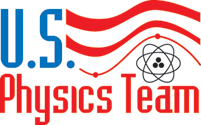Home
Team Facts & News
The Olympiad is a nine-day international competition among pre-university students from more than 60 nations. — AAPT.ORG

Each year, AAPT and the American Institute of Physics (AIP) sponsor a
competition for high school students to represent the United States at
the International Physics Olympiad Competition.
The mission of the U.S. Physics Team Program is to promote and
demonstrate academic excellence through preparation for and
participation in the International Physics Olympiad. Photos of the 2015 Team and camp are available on Flickr.
News
8/18/2015
The 2015 F=ma exam, and the USAPhO exam, with solutions have been posted HERE.
7/13/2015
2015 U.S. Physics Team Scores Five Medals in Mumbai, India!! Read the AAPT Press Release, and the AIP Press Release.
5/27/2015
The five students have been selected to represent the U.S. Physics Team as the 2015 Traveling Team at the 46th International Physics Olympiad, a competition among high-school physics students, to be held July 5 –12, 2015 in Mumbai, India.
5/13/2015
Meet the Coaches for the 2015 U.S. Physics Team!
5/8/2015
AAPT Announces the 2015 U.S. Physics Team This official announcement includes links to the International Physics Olympiad in Mumbai, India, a schedule for the competition, and links to team member information.
5/04/2015
2015 U.S. Physics Team announced!
Twenty students from across the U.S. have emerged through a rigorous exam process that began last January with approximately 4,390 students who participated in the Fnet=ma exam to become the 2015 U.S. Physics Team.
2015 Semi-finalists Medal Ranking list, Semi-final solutions will be posted soon
5/01/2015
U.S. Physics Team members, and Semi-final medal listing will be posted on Monday, May 4, 2015.
2/23/2015
A listing of students invited to take the USAPhO can be found by clicking HERE! The cutoff score this year is 18, F=ma solutions and scores will be sent to teachers in the next couple of weeks, if you have a student who qualified to take the USAPhO, you will be receiving a separate email with instructions for giving that exam.
2/5/2015
Students invited to take the USAPhO will be posted the third week of February. The testing dates for the USAPhO are March 16-22, 2015.
F=ma scores will be emailed to teachers after the semi-finalists have been posted.
Training camp will be held in Maryland, May 18-27, 2015, with team members arriving May 17th and departing May 28th.
For more details and information about the US Physics Team, please contact AAPT's Programs department at 301-209-3340 or programs@aapt.org

